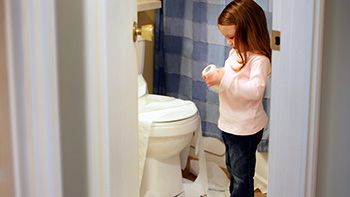 We all know that sometimes small children sneak into the bathroom and do their own tests on what should or shouldn’t be flushed down the toilet. Small toys, balls, and family pets don’t usually pass that test.
We all know that sometimes small children sneak into the bathroom and do their own tests on what should or shouldn’t be flushed down the toilet. Small toys, balls, and family pets don’t usually pass that test.
Our toilets are part of our daily lives and were invented to dispose of human waste. Using them for other purposes can damage your plumbing and possibly pollute a community’s water supply.
There is a very long list of items that should never be flushed down the toilet. Unfortunately, many of these items do end up in the commode. Remember: even though it has a wide mouth and powerful drainage, a toilet is not a trash can.
While most people know the obvious things that shouldn’t be flushed, here is a list of the not-so-obvious:
RELATED: 8 causes of a sewer backup in your home
RELATED: Understanding drain clogs and how to prevent them
- Wipes: This includes bathroom wipes, baby wipes or cleaning wipes of any kind. Despite the marketing of some moist towelettes as “flushable,” these wipes create clogs and sewer system backups. Not only do they not flush well, but they don’t degrade after being flushed, and they cost communities a lot of money in damages.
- Personal hygiene items: Never flush condoms, sanitary napkins, tampons or diapers. Even though condoms are small, latex does not dissolve or disintegrate like toilet paper and can cause trouble. Sanitary napkins, tampons and diapers are made to absorb water and do not break apart in it. All of these items need to go in the trash, not the toilet.
- Paper goods, other than toilet paper: What about napkins, paper towels, cotton balls, and cotton swabs? Paper napkins and towels are also made to absorb water, which means they will expand when flushed. While cotton seems small enough and similar to toilet paper, it does not break down like toilet paper. Eventually, these items gather together and cause blockages.
- Medications: Many people are told to flush down leftover prescription medication that is no longer needed. However, this is a dangerous practice. Different drugs destroy bacteria, contaminate groundwater or cause problems to wildlife. Check with your community’s police department for upcoming drug disposal dates, and discard your expired medications through these approved programs.
- Cigarette butts are a problem, as well, because they contain toxic chemicals that can end up in the water supply.
- Bandages and dental floss: Neither bandages nor dental floss is biodegradable, which is bad for the environment and can cause blockages.
- Cooked fat, oil or grease: You shouldn’t put these in your kitchen drain, so why would you dispose of them in the toilet? Any of these can cause clogging right away.
- Bleach, poisons and other hazardous waste: Bleach is a harsh chemical and doesn’t belong in sewage lines or septic systems. Poisons and other hazardous waste should never be flushed down a toilet. These can contaminate the water supply and damage pipes.
- Cat litter and droppings: Don’t empty the cat’s litter box in the toilet. Even though it seems like a good idea, cat waste contains toxins and other chemicals, plus the litter is made of clay and other products that can damage the toilet and pipes. Clumpable litter is even worse – since it’s made to harden into clumps when wet, that’s inviting a major backup in your pipes.
- Hair and chewing gum: Neither dissolves in water. Both can become tangled with other flushable and cause clogs.
Just remember that only things created by your body’s digestive system should be flushed – there’s a trash can for everything else. Always flush smart.
Other Articles That Might Interest You
9 water saving devices to install in your home
7 things you should NOT put down your garbage disposal
How to keep your shower drains from clogging
What are the biggest mistakes in DIY plumbing?
